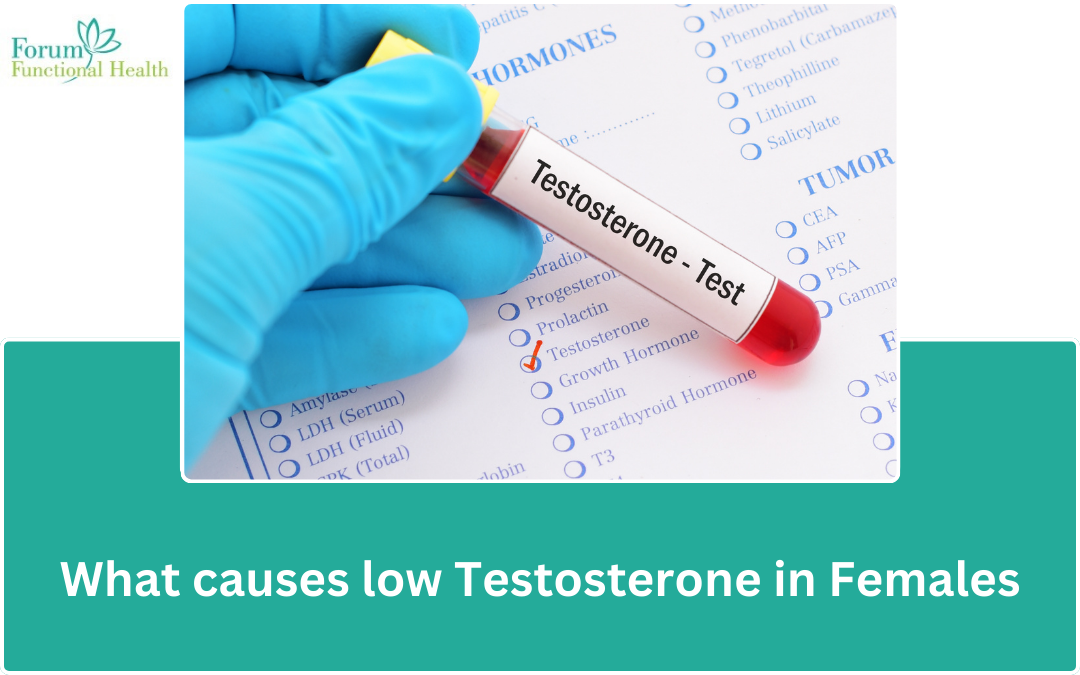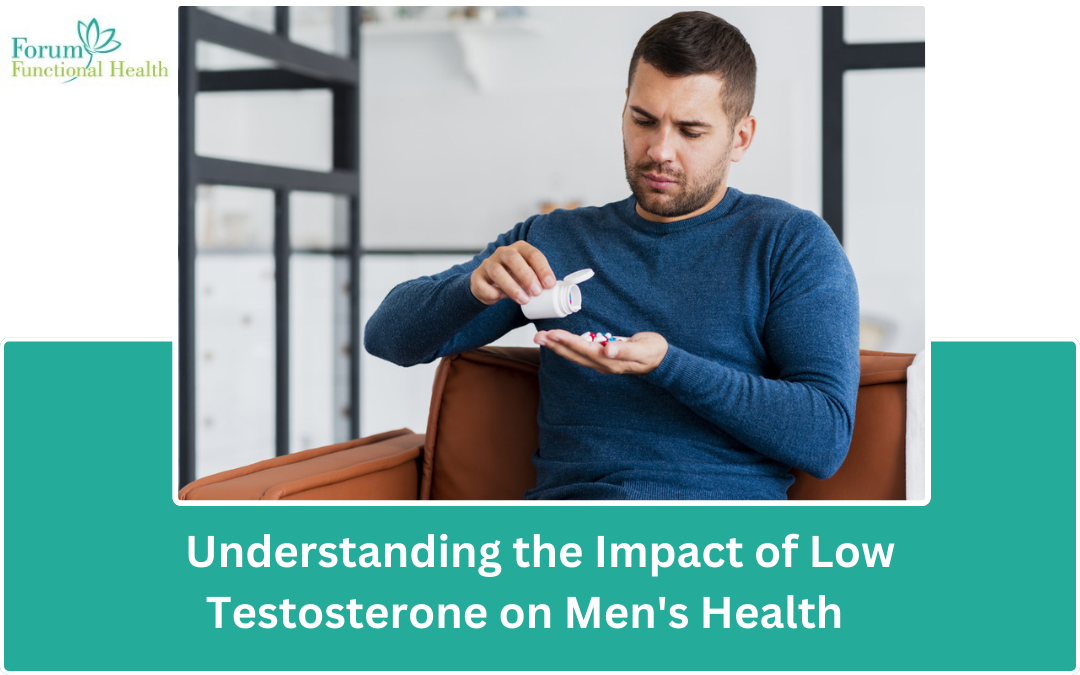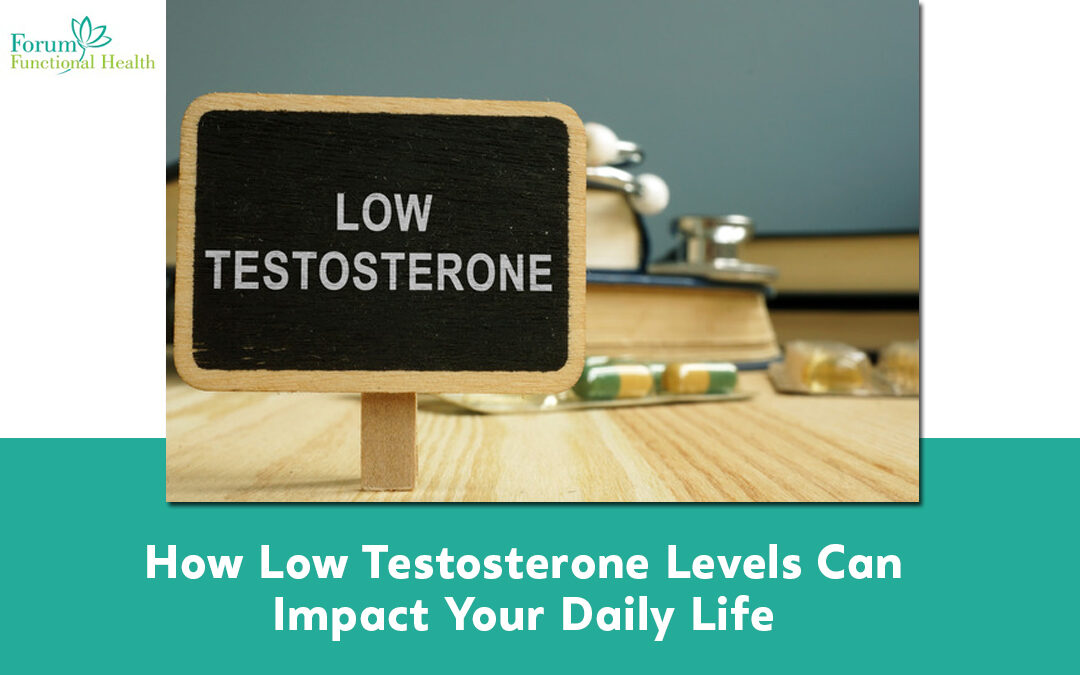
by Forum Functional Health Center | Apr 15, 2024 | Low Testosterone
In today’s fast-paced world, hormonal imbalances are becoming increasingly common among both men and women. While low testosterone is typically associated with men, it’s also a prevalent issue among females. Understanding the root causes behind low testosterone in women is crucial for effective diagnosis and treatment. Join us on a journey to unravel the mysteries behind this phenomenon as we explore the factors contributing to low testosterone levels in females.
What is Testosterone and Its Role in Females?
Testosterone is often dubbed as the “male hormone,” but it plays a vital role in the female body as well. Produced primarily in the ovaries and adrenal glands, testosterone is responsible for maintaining bone density, muscle mass, libido, and overall well-being in women. While women naturally have lower levels of testosterone compared to men, any significant drop can lead to various health issues.
Causes of Low Testosterone in Females:
Ageing:
As women age, especially after reaching menopause, their hormone levels, including testosterone, naturally decline. This decrease in testosterone production can result in symptoms such as fatigue, decreased libido, and reduced muscle mass.
Medical Conditions:
Certain medical conditions can disrupt the normal production of testosterone in females. Conditions such as polycystic ovary syndrome (PCOS), adrenal insufficiency, and hypothyroidism can lead to hormonal imbalances, including low testosterone levels.
Lifestyle Factors:
Unhealthy lifestyle habits, such as poor diet, lack of exercise, excessive stress, and inadequate sleep, can contribute to hormonal imbalances in women. Additionally, obesity has been linked to lower testosterone levels in females.
Medications:
Some medications, such as certain birth control pills, can interfere with hormone production in women, leading to decreased testosterone levels. It’s essential to discuss any potential side effects of medications with a healthcare provider.
Genetics:
Genetics can also play a role in determining a woman’s testosterone levels. Some women may have a genetic predisposition to lower testosterone production, which can manifest as symptoms of hormonal imbalance.
Low Testosterone Treatment in McKinney:
For women experiencing symptoms of low testosterone, seeking professional medical guidance is crucial. At Forum Functional Healthcare in McKinney, we specialize in holistic approaches to hormone imbalances, including low testosterone in females. Our experienced healthcare professionals provide personalized treatment plans tailored to address each patient’s unique needs.
Treatment options may include hormone replacement therapy (HRT), dietary and lifestyle modifications, stress management techniques, and supplements to support hormonal balance. Through comprehensive evaluation and ongoing monitoring, we strive to help women regain vitality and improve their overall quality of life.
Conclusion:
Low testosterone in females is a multifaceted issue with various underlying causes, ranging from ageing and medical conditions to lifestyle factors and genetics. By understanding these factors, women can take proactive steps to address hormonal imbalances and restore their vitality. With the right guidance and support from healthcare professionals, such as those at Forum Functional Healthcare in McKinney, women can embark on a journey towards hormonal balance and optimal health. Don’t let low testosterone hold you back—take charge of your health and well-being today!
Read More:- Understanding the Impact of Low Testosterone on Men’s Health

by Forum Functional Health Center | Mar 13, 2024 | Low Testosterone
Low testosterone, often referred to as low T, is a condition that affects many men as they age. Testosterone is a hormone primarily produced in the testicles and is crucial for various bodily functions, including muscle mass, bone density, sperm production, and sex drive. When testosterone levels drop below normal, it can have significant implications for men’s health and overall well-being. In this blog, we will delve into the effects of low testosterone and explore how it can impact men’s health.
Effects on Physical Health
One of the most noticeable effects of low testosterone is its impact on physical health. Men with low T may experience a decrease in muscle mass and strength, making it harder to perform everyday tasks and maintain an active lifestyle. Additionally, low testosterone levels can lead to an increase in body fat, particularly around the abdomen, which is associated with a higher risk of cardiovascular disease and type 2 diabetes.
Low testosterone can affect bone density, putting men at a greater risk of osteoporosis and fractures. This is because testosterone plays a crucial role in maintaining bone health by stimulating bone growth and preventing bone loss. Therefore, men with low T may be more susceptible to bone-related issues as they age.
Effects on Sexual Health
Testosterone plays a significant role in regulating libido (sex drive) and erectile function in men. Therefore, low testosterone levels can lead to a decreased interest in sex and difficulty achieving or maintaining erections. This can have a profound impact on intimate relationships and overall quality of life.
Low testosterone can contribute to other sexual health issues, such as infertility and reduced sperm production. Testosterone is essential for the development and maturation of sperm cells, so low levels of this hormone can impair fertility and decrease the chances of conception.
Effects on Mental Health
In addition to its physical and sexual effects, low testosterone can also impact mental health and emotional well-being. Many men with low T report symptoms such as fatigue, irritability, and depression. These mood changes can significantly impact daily functioning and overall happiness.
Moreover, testosterone plays a role in cognitive function, including memory, concentration, and spatial awareness. Therefore, men with low testosterone may experience difficulties with memory retention and mental clarity, affecting their ability to perform tasks that require focus and attention.
Treatment Options
Fortunately, there are several treatment options available for men with low testosterone. Testosterone replacement therapy (TRT) is the most common approach and involves administering synthetic testosterone either through injections, patches, gels, or pellets. TRT can help restore testosterone levels to normal and alleviate symptoms such as low libido, fatigue, and muscle loss.
However, it’s essential to consult with a healthcare professional before starting TRT, as it may not be suitable for everyone. They will conduct a thorough evaluation to determine the underlying cause of low testosterone and recommend the most appropriate treatment approach based on individual needs and health status.
Forum Functional Health Care
For men struggling with low testosterone and its associated health issues, finding support and guidance is crucial. At Forum Functional Health Care, we specialize in holistic approaches to men’s health, including hormone optimization and lifestyle interventions.
Our team of experienced healthcare providers understands the complex interplay between hormones, nutrition, exercise, and mental well-being. We offer personalized treatment plans tailored to each individual’s unique needs, addressing the root cause of low testosterone and promoting long-term health and vitality.
Through a combination of medical expertise, cutting-edge diagnostics, and ongoing support, we empower men to reclaim their health and optimize their quality of life. If you’re experiencing symptoms of low testosterone or simply want to learn more about how to improve your overall health and well-being, we’re here to help.
Low testosterone can have a profound impact on men’s health, affecting physical, sexual, and mental well-being. However, with the right treatment and support, men can effectively manage low T and improve their quality of life. Whether through testosterone replacement therapy or holistic interventions, it’s essential to address the underlying causes of low testosterone and take proactive steps towards better health. At Forum Functional Health Care, we’re committed to helping men thrive at every stage of life, providing comprehensive care and support for optimal health and vitality.

by Forum Functional Health Center | Feb 9, 2024 | Low Testosterone
Low testosterone levels, also known as Low T, can have a significant impact on various aspects of daily life for men. From energy levels to mood and overall well-being, understanding the implications of low testosterone is crucial for maintaining a healthy lifestyle. In this blog, we’ll explore how Low Testosterone levels can affect different areas of daily life and discuss potential treatment options.
Energy Levels and Fatigue: One of the most noticeable effects of low testosterone levels is a decrease in energy levels. Testosterone plays a vital role in regulating energy production within the body. When testosterone levels are low, men may experience fatigue, lethargy, and a general lack of motivation. This can make it challenging to perform daily tasks, engage in physical activity, or even concentrate at work.
Mood and Emotional Well-being: Testosterone also influences mood and emotional well-being. Low testosterone levels have been linked to symptoms of depression, irritability, and mood swings. Men may find themselves feeling more anxious or stressed than usual, which can impact their relationships and overall quality of life. Understanding the emotional implications of low testosterone is essential for seeking appropriate support and treatment.
Sexual Health and Libido: Testosterone plays a crucial role in sexual health and libido. Men with low testosterone levels may experience a decrease in sex drive, erectile dysfunction, or difficulty achieving orgasm. These issues can have a significant impact on intimate relationships and self-esteem. It’s essential to address these symptoms promptly to restore sexual function and improve overall well-being.
Muscle Mass and Strength: Another area affected by low testosterone levels is muscle mass and strength. Testosterone helps maintain muscle tissue and contributes to muscle growth. When testosterone levels are low, men may experience a decline in muscle mass, increased body fat, and reduced strength. This can affect physical performance, exercise capacity, and overall mobility.
Cognitive Function and Memory: Testosterone also plays a role in cognitive function and memory. Low testosterone levels have been associated with cognitive decline, poor concentration, and memory problems. Men may find it challenging to focus on tasks or retain information, which can impact work performance and daily functioning.
A Forum Functional Health approach to addressing hormonal imbalances, such as low testosterone levels, prioritizes holistic assessment and individualized care. This approach encompasses various elements, starting with a comprehensive evaluation of lifestyle, nutrition, stress levels, and overall health to identify underlying factors contributing to the hormonal imbalance.
Based on this assessment, tailored treatment plans are crafted to address the unique needs of each individual, emphasizing lifestyle modifications, stress management techniques, nutritional support, and regular monitoring. These interventions aim to naturally support hormone balance and overall well-being.
Where testosterone levels are severely low and necessitate medical intervention, testosterone injection therapy may be recommended by a healthcare professional. Testosterone injection therapy involves the administration of intramuscular injections, typically on a weekly or less frequent basis.
Regular monitoring through blood tests is crucial to ensure the therapy’s effectiveness and adjust the dosage as needed, ensuring optimal hormone levels and overall health outcomes. This integrated approach combines lifestyle modifications with medical intervention, offering a comprehensive and personalized solution to address hormonal imbalances and support long-term wellness.



